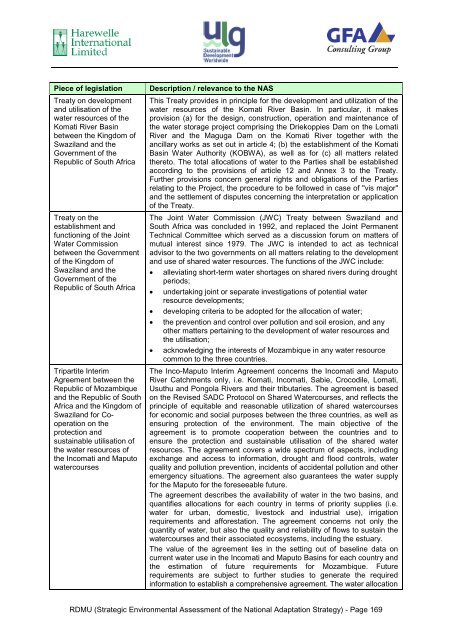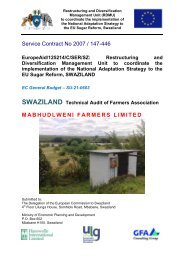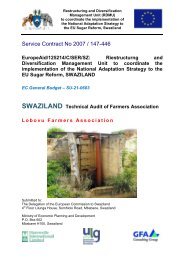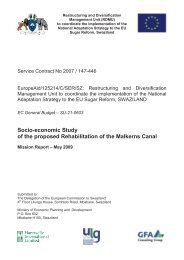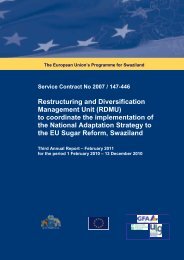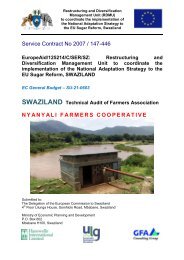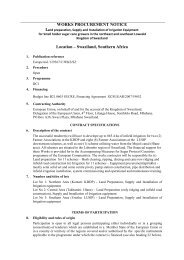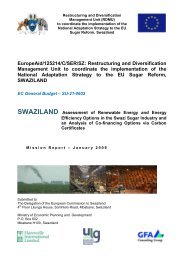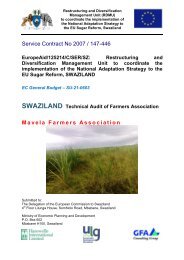Service Contract No 2007 / 147-446 Strategic ... - Swaziland
Service Contract No 2007 / 147-446 Strategic ... - Swaziland
Service Contract No 2007 / 147-446 Strategic ... - Swaziland
- No tags were found...
Create successful ePaper yourself
Turn your PDF publications into a flip-book with our unique Google optimized e-Paper software.
Piece of legislationTreaty on developmentand utilisation of thewater resources of theKomati River Basinbetween the Kingdom of<strong>Swaziland</strong> and theGovernment of theRepublic of South AfricaTreaty on theestablishment andfunctioning of the JointWater Commissionbetween the Governmentof the Kingdom of<strong>Swaziland</strong> and theGovernment of theRepublic of South AfricaTripartite InterimAgreement between theRepublic of Mozambiqueand the Republic of SouthAfrica and the Kingdom of<strong>Swaziland</strong> for Cooperationon theprotection andsustainable utilisation ofthe water resources ofthe Incomati and MaputowatercoursesDescription / relevance to the NASThis Treaty provides in principle for the development and utilization of thewater resources of the Komati River Basin. In particular, it makesprovision (a) for the design, construction, operation and maintenance ofthe water storage project comprising the Driekoppies Dam on the LomatiRiver and the Maguga Dam on the Komati River together with theancillary works as set out in article 4; (b) the establishment of the KomatiBasin Water Authority (KOBWA), as well as for (c) all matters relatedthereto. The total allocations of water to the Parties shall be establishedaccording to the provisions of article 12 and Annex 3 to the Treaty.Further provisions concern general rights and obligations of the Partiesrelating to the Project, the procedure to be followed in case of "vis major"and the settlement of disputes concerning the interpretation or applicationof the Treaty.The Joint Water Commission (JWC) Treaty between <strong>Swaziland</strong> andSouth Africa was concluded in 1992, and replaced the Joint PermanentTechnical Committee which served as a discussion forum on matters ofmutual interest since 1979. The JWC is intended to act as technicaladvisor to the two governments on all matters relating to the developmentand use of shared water resources. The functions of the JWC include:• alleviating short-term water shortages on shared rivers during droughtperiods;• undertaking joint or separate investigations of potential waterresource developments;• developing criteria to be adopted for the allocation of water;• the prevention and control over pollution and soil erosion, and anyother matters pertaining to the development of water resources andthe utilisation;• acknowledging the interests of Mozambique in any water resourcecommon to the three countries.The Inco-Maputo Interim Agreement concerns the Incomati and MaputoRiver Catchments only, i.e. Komati, Incomati, Sabie, Crocodile, Lomati,Usuthu and Pongola Rivers and their tributaries. The agreement is basedon the Revised SADC Protocol on Shared Watercourses, and reflects theprinciple of equitable and reasonable utilization of shared watercoursesfor economic and social purposes between the three countries, as well asensuring protection of the environment. The main objective of theagreement is to promote cooperation between the countries and toensure the protection and sustainable utilisation of the shared waterresources. The agreement covers a wide spectrum of aspects, includingexchange and access to information, drought and flood controls, waterquality and pollution prevention, incidents of accidental pollution and otheremergency situations. The agreement also guarantees the water supplyfor the Maputo for the foreseeable future.The agreement describes the availability of water in the two basins, andquantifies allocations for each country in terms of priority supplies (i.e.water for urban, domestic, livestock and industrial use), irrigationrequirements and afforestation. The agreement concerns not only thequantity of water, but also the quality and reliability of flows to sustain thewatercourses and their associated ecosystems, including the estuary.The value of the agreement lies in the setting out of baseline data oncurrent water use in the Incomati and Maputo Basins for each country andthe estimation of future requirements for Mozambique. Futurerequirements are subject to further studies to generate the requiredinformation to establish a comprehensive agreement. The water allocationRDMU (<strong>Strategic</strong> Environmental Assessment of the National Adaptation Strategy) - Page 169


